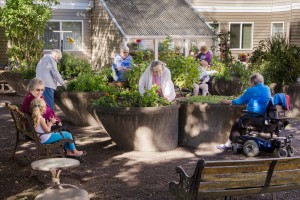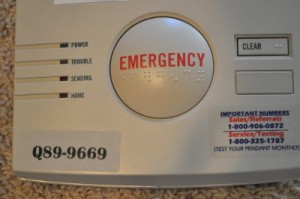Assisted Living – Pros and Cons
 Many Baby Boomers retiring today prefer to live independently at home for as long as possible. Others choose assisted living for a variety of benefits that are not available to seniors living alone. As an alternative to “aging in place,” assisted living has both pros and cons for senior citizens.
Many Baby Boomers retiring today prefer to live independently at home for as long as possible. Others choose assisted living for a variety of benefits that are not available to seniors living alone. As an alternative to “aging in place,” assisted living has both pros and cons for senior citizens.
Advantages of Assisted Living
Most senior communities today do not have the institutional feel of assisted living facilities of the past. These communities offer a number of benefits to older people, along with varying levels of care. Assisted living may be a good fit for senior citizens who prioritize certain advantages.
No More Home Maintenance or Yard Work
Keeping up a home and yard is a never-ending job, particularly for older people with physical ailments or limitations. Mowing the lawn, pulling weeds, constant cleaning, and keeping up with household repairs may not be how some seniors want to spend their golden years. Assisted living facilities take care of the hard work for you.
Free Transportation
As we grow older, driving can become more stressful. Many senior communities provide free transportation to residents, with door-to-door service. Seniors are shuttled to shopping centers and community events, and transportation can be arranged for medical appointments and other individual outings.
Greater Safety
Safety is one of the main concerns for seniors living independently at home. Risks to older people range from serious falls to sudden illness to burglaries. Assisted living communities are designed to provide a secure, comfortable environment for seniors.
Better Nutrition
Older people need to eat smaller quantities of nutrient-dense food. Unfortunately, senior citizens living alone may not always eat the way they should. At many senior living communities, residents do not have to worry about grocery shopping or meal preparation. Instead, they can dine with others daily, enjoying a variety of nutritious meals.
Social Engagement
Older people living alone can become isolated, which can contribute to mental and physical health issues. In assisted living communities, seniors have an opportunity to socialize and make new friends. Residents are able to build new relationships with fellow residents, staff, and volunteers.
Down Side of Assisted Living
Despite its advantages, assisted living is not for everyone. Some seniors want to stay in their own home and may not adjust well to a group setting. Older people aging in place are free to set their own schedule, make their own rules, and live life exactly as they choose. More independent seniors may feel a lack of privacy and freedom in an assisted living environment.
Cost can be a major drawback to assisted living for many senior citizens. In addition to a monthly charge, senior living facilities charge add-on fees for personal care. Medicare does not cover the costs of assisted living facilities.
Older people who need specialized or intensive medical care or who suffer with Alzheimer’s or dementia are not likely to receive the care they need in an assisted living facility. This higher level of care is typically only provided in nursing home facilities.
Medical Alerts for Seniors
Particularly for those who choose independent living, medical alerts for seniors can bring peace of mind to both senior citizens and their loved ones. With the simple push of a button on a bracelet or pendant, an older person can get help on way immediately in an emergency. Prompt medical attention can make all the difference after a serious fall or in certain medical crises.
Modern medical alerts for seniors come with a variety of features, including mobile GPS location identification and automatic fall detection. Our medical alert comparison is designed to give you a quick look at some available systems and the features they offer.



